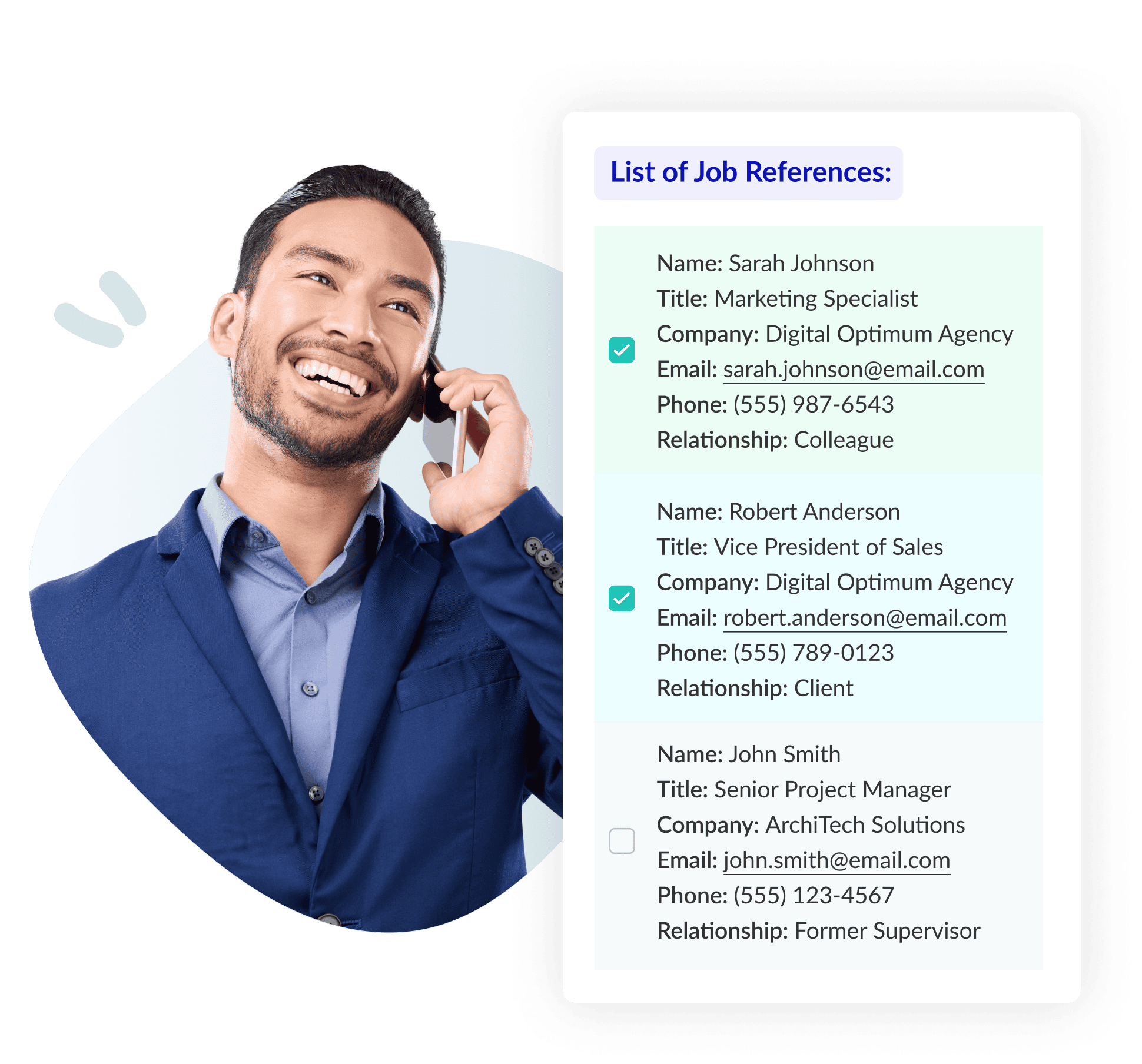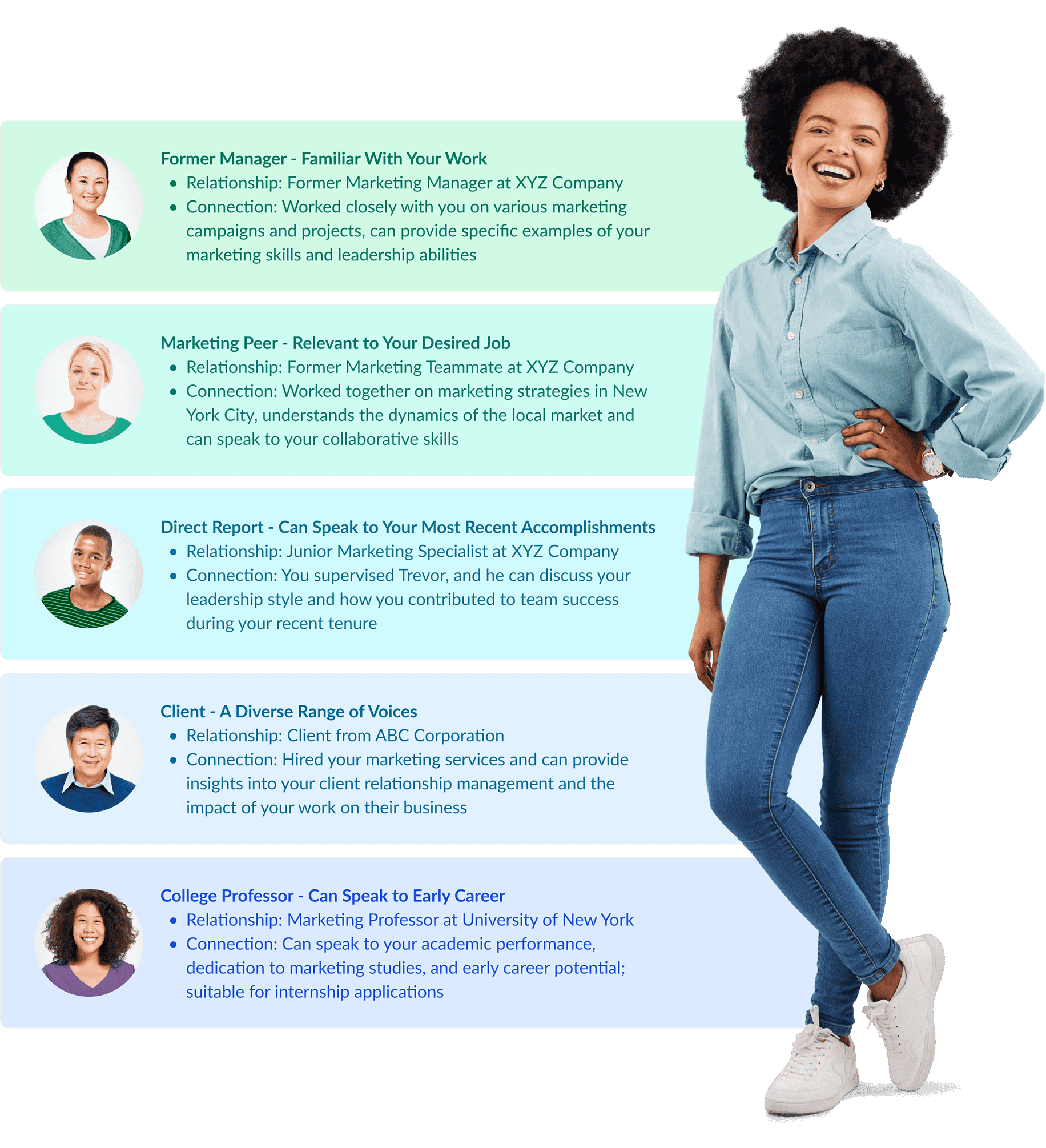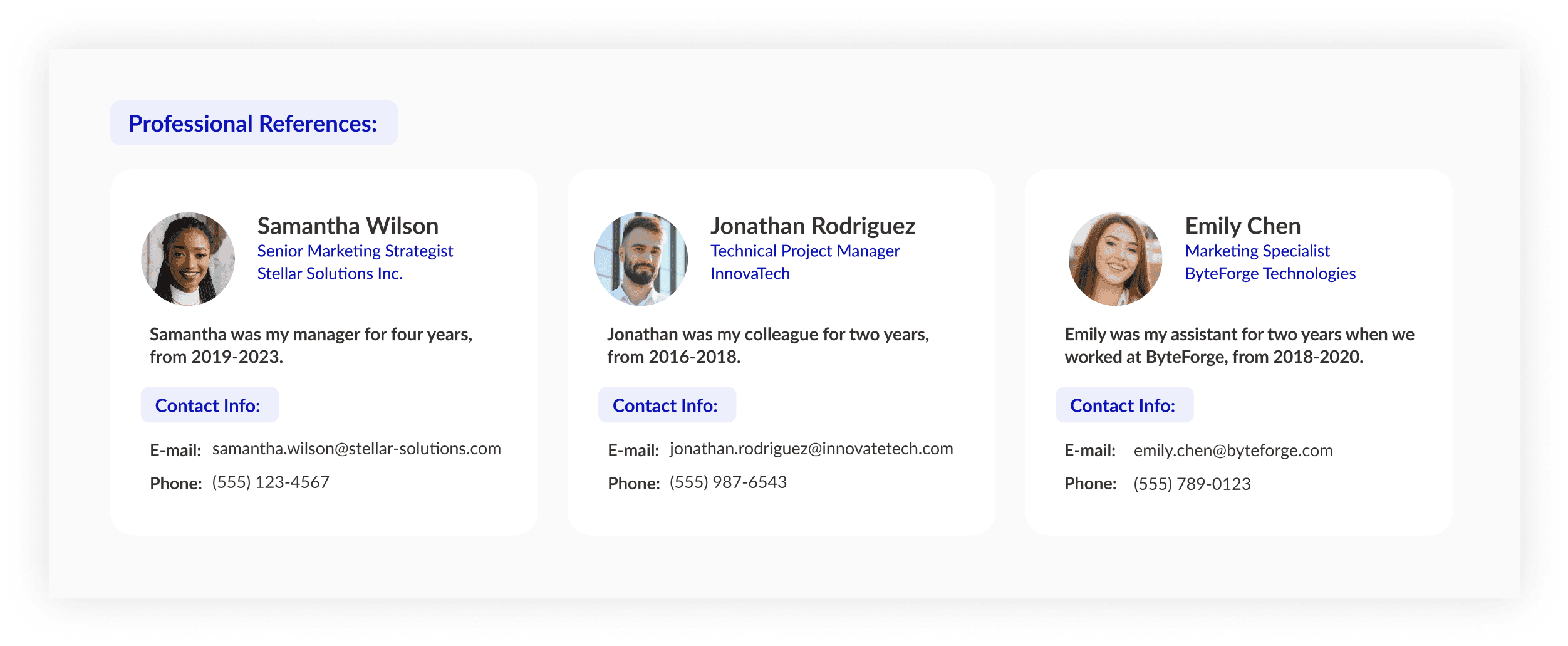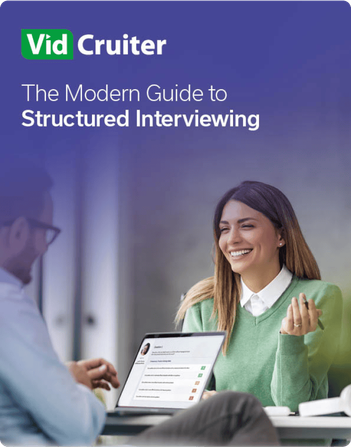
How to Ace Your Video Interview
Master your next video interview with our ultimate guide! Get expert tips and insights to secure your next job.

Professional references are people like a former boss, coworker, professor, supervisor, or mentor who can provide their opinion on your work to a potential employer. They can be a make-or-break factor for landing a job, but figuring out how to ask someone to be a reference can be challenging.
If you’ve asked yourself questions like, “What’s the best way to ask someone to be a reference?” or “How many references should I provide?”, keep reading to learn everything you need to know about selecting, contacting, and keeping track of professional references.
A professional reference can vouch for your skills and accomplishments, help you stand out from other applicants, and boost a potential employer’s confidence in hiring you. These people should know you well, have seen your work firsthand, and can speak positively about your accomplishments and skills. Employers will often contact your professional references for a "reference check" to learn more about your capabilities and better understand if you’re a good fit for the role.

Not all references are equal. Professional references are people you’ve worked with directly, like a boss, coworker, or client. They can give specific examples of your skills and performance in a work setting.
Personal references are friends or family members who can vouch for your character traits and qualities and give an employer an idea of what kind of person you are outside of work, like your values and work ethic.
The type of reference you need depends on the employer. However, since your loved ones will be biased, they rarely make good professional references, and some employers may even have rules against using friends or family members as references.
Even if the hiring manager doesn't specify the type of reference they would like, choosing people who can offer a professional perspective on your work abilities is still best.
Choosing professional references can be nerve-wracking. Maybe you’re worried about picking the wrong person and hurting your chances of getting the job. Or perhaps you’re not sure who to ask in the first place.
To help narrow things down (and ease any anxieties you might have), here are a few simple criteria for selecting the best references for your job applications.

Familiar With Your Work
You can only capture so much in a resume or cover letter. That’s why your references should be people you have worked closely with, who can provide specific examples and details about your abilities and paint a more accurate and comprehensive picture of yourself as a professional.
Relevant to Your Desired Job
Certain references may be more suitable than others, depending on the job you’re applying for. For example, let's say you’re applying for a marketing role in New York City. A reference from a previous marketing manager in that city, or even that state, would likely hold more weight than someone in a different field or location.
Can Speak to Your Most Recent Accomplishments
Your references should have worked with you recently enough to know how you work and what you bring to the table as a candidate now. For example, a college professor may be a suitable reference for a 20-year-old looking for a summer internship but not for a mid-career candidate with decades of professional experience.
A Diverse Range of Voices
Choose a mix of people who know you well, like a former manager, a work peer, a direct report, and maybe some clients to give your potential employer a well-rounded view of your work style.
It’s normal to feel nervous about asking for job references. You don't want to be a pest or come off as unprofessional, right? Plus, there’s always that underlying fear that the person you’re asking might not give you the glowing recommendation you hoped for.
Asking for job references can be a vulnerable and potentially anxiety-provoking candidate experience, but these tips will help you make the ask like a total pro.
Establish a Strong Professional Relationship
A potential reference should know you well and be familiar with your work, so you don’t want to ask someone too early on in your relationship with them. Wait until you’ve worked together on a project or assignment and feel like you’ve established a substantial, positive connection with this person.
Give Them Plenty of Notice
You want your references to have enough time to prepare and think about what they want to say about you. It’s best to ask well in advance, so don’t be afraid to ask them at the beginning of the job search process.
Follow Up
When you ask someone to be your reference, follow up with them a few days later to confirm they’ve got everything they need and answer any questions about the job you’re applying for. It’s a nice thing to do and might make them feel more comfortable about giving you a reference. It could also give you a little confidence boost during the interview process.
Show Gratitude
A simple thank you note or email can go a long way in leaving a great impression on your references. Let them know that you appreciate the time and effort they put into supporting you, and perhaps even offer to return the favor.

To get that glowing review you deserve and further boost your chances of getting that job, be sure to give your references as much information as possible about the role, your qualifications, and what you'll need from them.
Here are a few critical details you should mention when making your ask.
Provide Context About the Job Opportunity
Provide some background information about what roles you’re looking for and why. People will be much more willing to support you if they understand why you need their help.
Share a Copy of Your Resume (And Any Other Relevant Documents)
Give your references all the tools they need to advocate for you by sending them a copy of your resume, cover letter, the job description for the position, and any other relevant documents, like a portfolio or work samples. You should also tell them the specific skills or qualities you want them to highlight.
Set Expectations Around Due Dates and Timelines
Include a due date in your request so they know how quickly you need their help and can plan accordingly. You should also tell them when they can expect to hear from potential employers.
Did you know that volunteering could increase your chances of getting hired?
A 2021 study found that people who do volunteer work receive 45% more callbacks for interviews, so consider reaching out to past volunteer supervisors or organizers you’ve worked with to see if they’d be willing to put a good word in for you.

You’ve reached out to a couple of people, and they’ve agreed to be your reference, but how do you keep track of them all and remember which references you’ve used for which applications?
Here are a few tips to help you organize your contacts list.
Create a Spreadsheet
Set up a spreadsheet with details such as names, job titles, organizations, emails, phone numbers, dates you worked together, and the details about the last time you used them as a reference. Update it regularly so you can quickly provide their contact information when a potential employer asks for it.
Note the Key Topics They Could Speak To
When you were talking to hiring managers or recruiters, did they ask any interview questions about your qualifications or experience? Jot those down so you know which people you should use as references for that application.
Follow Up
Let them know if you landed the job. It’s a great way to show appreciation for their help and stay connected.

Your professional references could be the difference between landing a job or getting passed over for another candidate, so don’t treat this task lightly. From who you choose to how you make the ask, being thoughtful and intentional with your approach will help your references help you.
Lastly, remember your references aren’t just names and job titles on a spreadsheet. They’re your advocates and edge in a competitive market. Use the tools you’ve gained from this guide to build a solid list of references and deepen your connections to a network of people who believe in you and your abilities.


Recruitment Essentials:
Versatile Video Interviews
Unlock the potential of recruitment automation with VidCruiter's comprehensive interviewing solutions. Our platform offers:
Join thousands of organizations transforming their hiring process. Learn more and book a demo.
Even if you don’t have any formal work experience, you probably have some people who aren’t your friends and family who could vouch for your abilities. Teachers, tutors, coaches, or even volunteer coordinators who have seen you in action make good professional references. If you’re struggling to find references and you’re looking for an entry-level position, don’t stress. HR Dive explains that references may not always be possible in their tips for handling reference checks.
The hiring manager or recruiter will usually tell you how many they need. If they don’t give you a specific number, Indeed suggests three references is generally acceptable, as you don’t want to overwhelm your potential employer with an excessively long list.
Career experts at Monster suggest you refrain from including references on their resume, or even the phrase such as "References Available Upon Request." This is for a few reasons: Firstly, it takes up valuable space on a resume. Possibly more importantly, many employers check references toward the end of the hiring process or before they’re ready to make an offer, so you typically don’t need to include references on resumes anymore.
Still, gathering references can take time, so it’s a very good idea to have them prepared. Many hiring managers will tell you when they’re about to check references so that you can give those people a heads-up.

E-BOOK
The Modern Guide to Structured Interviewing
Get your free copy of VidCruiter’s comprehensive white paper about structured interviewing. This practical guide:
By providing email address, you agree to receive
updates from VidCruiter.
Read our
Privacy Policy
Modernize your hiring process with expert insights and advice.